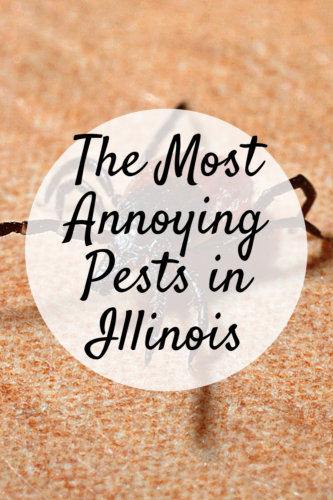
Bug bites are an inevitable annoyance when you spend time outdoors. Sometimes, they happen to be so annoying that they drive us back inside. As organisms harmful to both plants and animals, pests can effectively destroy essential food crops required for consumption. They also act as disease causative agents, spreading contagious and highly deadly ailments.
Whether it is bothersome mosquitoes or the invisible chiggers, many people worldwide have experienced the impact of pests. And they all agree about the adverse effects these pests can have on their lives.
According to various studies and research, some of these pests can be more detrimental than others. When it comes to the state of Chicago, the people of Illinois have an unsavory tale to tell about these pests.
Regardless of the time of the year, here are the top pests the inhabitants of Illinois find annoying, primarily due to their destructive and disease-causing effects.
Mosquito:
Mosquitoes top this list not because they are the most common, but they also are highly destructive and possess a high disease causative tendency. In fact, according to the Illinois Department of Public Health, mosquitoes are the deadliest animal on Earth, responsible for millions of deaths every year.
Most mosquito-related deaths happen due to malaria, but the disease isn’t quite common in the United States. Nonetheless, that doesn’t mean people are safe from mosquito-related illnesses.
In the Illinois area, mosquitoes are the primary cause of ailments like encephalitis. Mosquitoes transmit the West Nile virus, which can cause various forms of encephalitis, such as St. Louis encephalitis, Eastern equine encephalitis, La Crosse encephalitis, and Western equine encephalitis.
Perhaps, the best way to prevent mosquito bites is to avoid the bugs altogether. For this reason, the extermination of these groups of pests remains the vision of pest control in Chicago.
You can also take preventive measures like being indoors during the most active times for mosquitoes—dusk and dawn. If you spend time outdoors during peak times, ensure you use mosquito repellent.
Ticks:
Ticks are arachnids, meaning they are not insects and are related to spiders and scorpions. Nevertheless, that doesn’t make them any less annoying for the inhabitants of Illinois. Ticks bite humans and other animals for a blood meal and are hence effective disease vectors.
Among the several diseases, ticks transmit to humans are Lyme disease, tularemia, babesiosis, Rocky Mountain spotted fever, and ehrlichiosis. Soon after a tick bites you, you will develop a bull’s eye rash or an unexplained illness with fever. In such a case, you will have to quickly contact your doctor and let them know a tick has bitten you.
Your best bet to avoid tick bites is to avoid tick-infested areas. In case you visit a wooded area with tall grasses, ensure you wear protective clothing—long pants, long-sleeved shirts, boots, and head covering. Also, stay in the center of the path, away from the vegetation. If you find a tick, remove it quickly using tweezers.
Fleas:
People often view these insects as parasites to animals like cats and dogs, but they bite humans. In fact, there exist several types of fleas—cat fleas, dog fleas, and even human fleas. While cat and dog fleas mostly prefer cats and dogs alongside some wildlife, they can bite you when you bring your pets inside. Human fleas, on the other hand, bite humans and pigs.
When fleas bite humans, a chemical in their saliva enters the bloodstream causing an immune system response that results in endless itching and irritation. Flea bites are often a nuisance, but they can also cause cat scratch fever when an infected cat lick, scratch, or bite you.
Managing fleas require treating the areas where fleas are found. If you have pets, you might want to consult with a veterinarian to treat your pet.
Chiggas:
Chiggas are tiny arachnids but possess characteristic features similar to anthropods. Chiggers are often found in less disturbed areas, but they can also be found in soil in newly developed areas for years before surfacing.
Chiggers are known as non-disease transmitters, and they typically feed on ground-dwelling birds and rodents. So, humans aren’t their first choice of host. Unlike other pests, chiggers don’t eat blood. Instead, they bite to inject their skin-digesting saliva into the host so that they can consume the liquified skin. When this happens, you will experience severe itching and discomfort. In fact, Illinois inhabitants consider this an annoying feature of this group of pests.
Consider using repellent containing around 7 to 30 percent DEET to prevent chigger bites.
Sandflies:
The bite of sandflies can often be a painful shock. This is because they have scissor-like mouthparts that open your skin, allowing flies to suck up the blood. However, sandflies are not the only types of biting fly. There also exist black flies, deer flies, biting midges, stable flies, and more. And inhabitants of Illinois find this group of insects annoying.
While most fly bites are harmless, some people have allergic reactions to them that can be life-threatening. The saliva gets into the victim’s skin and causes extreme itchy conditions.
Apart from being prevalent in areas known to be sandy, sandflies thrive in warm and arid conditions. Insect repellents, especially those containing DEET or picaridin, can help keep these flies at bay.
Stay Safe from Pests
You can do a few things before calling pest control to protect your home and family from pests. This includes getting rid of stagnant water, vacuuming your home regularly, filling small holes or gaps in walls, floors, ceiling, etc.
The rising spread of pests is alarming, and you must take the proper measures to get rid of pests to avoid falling victim to deadly diseases.





Leave a Reply